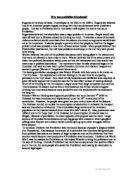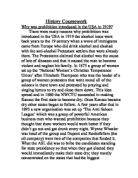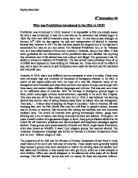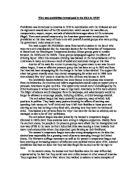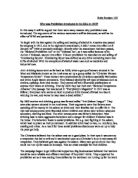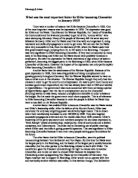Why had international peace collapsed by 1939?
Why had international peace collapsed by 1939? When Hitler came to power in Germany in 1933, Hitler slowly began the rearmament of Germany. He started to rebuild the army and tried to make stronger weaponries. The Treaty of Versailles restricted German army and also, the treaty demanded Germany to pay lots of reparations. Not only a Hitler, many German thought that the treaty was unjust and it was too harsh. One of promise that Hitler made was that if he became a leader of Germany, he would reverse the treaty. Hitler wanted to make Germany strong again. The treaty restricted German army and took so much territories. Hitler wanted to get those territories back, especially the important industrial areas. And he wanted Germany to unite with Austria. Because of the treaty of St. German, Austria was forbidden ever to unite with Germany. In the 1930s there were two incidents that really tested the League of Nations were Manchurian crisis and Abyssinian crisis. In Manchurian crisis, Japan invaded Manchurian but League didn't take any action. In Abyssinian crisis, Italy invaded Abyssinia but like as Manchurian crisis, League didn't give a sanction against Italy. As a result from these 2 events, Hitler realized that the League is powerless and irrelevant. In 1936 Hitler began his policy of reclaiming lost German territory. Britain signed agreement with Germany and for the next three
Why had international peace collapsed by 1939?
Why had international peace collapsed by 1939? When Hitler came to power in 1933 he had three main aims, the abolishment of the treaty of Versailles, to expand German territory and to defeat communism. Like most of the German population, Hitler believed that the Treaty of Versailles was unjust. The treaty was a constant reminder of Germany's defeat in World War One and their humiliation by the Allies. Hitler promised that he would reverse the treaty. The terms of the treaty, although tampered with for the self-interest of 'the big 3' was meant to secure peace and so by abolishing it, Hitler had started to crack the security in international peace between nations. The treaty had taken land away from Germany and Hitler pledged to take this territory back. He wanted to unite with Austria and wanted to carve out an empire in Eastern Europe to give extra Lebensraum (living space) for Germans. For this, war was inevitable and so the chances of lasting peace diminished. A German empire carved from the Soviet Union would also help Hitler in another of his aims, the defeat of Communism or Bolshevism. Hitler was anti-communist and believed that the Bolsheviks helped defeat Germany in WW1 and still wanted to take over Germany. In the 1930s there were two incidents that really tested the League of Nations, the Manchurian and Abyssinian crisis'. Both the Manchurian and Abyssinian
Why had international peace collapsed by 1939?
Prep Why had international peace collapsed by 1939? In January 1933, Adolf Hitler came to power in Germany and immediately began to challenge the Treaty of Versailles and adapt an aggressive foreign policy which led to war. It is easy to blame Hitler for starting war in 1939. His underlying aims were already aggressive. The actions which he took in the following years all followed these three aggressive aims: to destroy the Treaty of Versailles, to unite all Germans in one country and to create a living space in Eastern Europe. For example Hitler's rearmament was part of his aims. This was contrary to the treaty of Versailles. His rearmament was not allowed as in the Treaty of Versailles it said the Army must be no more than 100,000 and conscription was not allowed. Hitler's actions such as these made countries very tense including France. In the 1930s there were two incidents that really tested the League of Nations. These are important in the road to World War two. The first one happened in Manchuria. Japan was trying to control it in their own interests for living space and for natural resources. The league did nothing to help as they did not have support from America. This showed the League's fear of Japan as well. Japan also left the League. The way the league dealt with the problem clearly showed the inability of Britain and France to handle tension and problems which
Why had the Western Front been established by the end of 1914?
Why had the Western Front been established by the end of 1914? The Western Front was established due to the stalemate between British/French and German troops, due to the failure of German attempts to capture Paris. The Western Front was 700 Km of trenches containing around four million troops at any one time. In order to answer this question, it is best to start with the first and most important cause of the western front, the First World War. In order to have a war, you need yet more causes for that to come about, This brings me to my first point of analysis; the struggle between Austro-Hungary and Serbia. After Serbia has become an independent state in 1878, many Serbs living inside the Hapsburg Empire wanted independence from the Empire and a place in free Serbia. This in turn lead to problems, and the Austrian government accusing Serbia of stirring trouble in Bosnia, a Serbian region and couldn't face a possible loss of over 8 million Serbs to Serbia, as this would break up the Austro-Hungarian Empire for sure. On the 28th of June 1914, the heir to the Austrian throne and major political target was shot dead during a parade in Sarajevo. A month after this shooting, the First World War had begun. The declaration of war was due to the Austrian government blaming Serbia for the assassination. Although it was right-wing political protester and member of the Black Hand
Why was prohibition bound to fail?
GCSE HISTORY COURSEWORK ASSIGNMENT A (objective 1) Why was prohibition bound to fail? 3. Was prohibition bound to fail? For what seemed to be the end of lots of the social problems in the USA, turned out to make the country a more violent place. At the start, prohibition gained great support, but in the end the whole country turned against the idea. Prohibition was first introduced in 1919 as the 18th amendment of the American constitution. It lasted for 14 years before in 1933 the 21st amendment, or the Volstead act was passed. There are many reasons as to why prohibition didn't work. The USA was riddled with corruption and violence, all brought along by the introduction of prohibition. In the USA, before prohibition, Alcohol provided a social activity for most American citizens. This was one of the biggest problems with the law, people just wanted to have a legal drink. Nearly all American citizens had an urge for an alcoholic beverage. This signalled that prohibition was going to have problems with gaining it's needed support. If there is no support for a law, it will cause a lot of trouble trying to uphold the law. Another factor, which boded greatly against prohibition, was the natural human ethic, to want to break laws. When a law is made, there are always some people who will want to go against it and break it. Because of these two factors, ordinary people wouldn't
Why was prohibition introduced?
Why was prohibition introduced? Eugenics is the study of races. It developed in the USA in the 1900's. Eugenicists believed that if the American people stopped drinking then they would become better (healthier) people. This led to Prohibition and in this essay I will explain the events that led to Prohibition. Eugenicists believed that alcoholism was a major problem in America. People would take days off wok due to illnesses caused by drinking too much. It was also a cause of domestic violence as fathers would come back from the saloons drunk and so arguments would brake out in the household. It also led people to poverty which led people to theft but the biggest problem of all was probably a new trend of loose sexual morals. Many people believed that if alcoholism was banned, then all these problems would stop, in the end they were proved to be wrong. Women believed that a lot of the political discussions were taking place in the saloons and they were not allowed to have a say in them. Women believed that if the saloons were shut down then political discussions would come out into the mainstream and they would then have a say in political discussions. The movement to ban the sale of alcohol began in the American mid-west and was taken up by Protestant churches (Anti-Saloon League) and women's groups (Women's Temperance Movement). The leading prohibition
Why was prohibition introduced in the USA in 1919?
History Coursework Why was prohibition introduced in the USA in 1919? There were many reasons why prohibition was introduced in the USA in 1919 the alcohol issue went back years to the 19 century when a wave of immigrants came from Europe who did drink alcohol and clashed with the anti-alcohol Protestant settlers that were already there. The Protestants claimed that alcohol was the cause of lots of diseases and that it caused the man to become violent and neglect his family. In 1875 a group of women set up the 'National Women's Christian Temperance Union' after Elizabeth Thompson who was the leader of a group of women protesters that went round all of the saloons in there town and protested by praying and singing hymns to try and close them down. This idea spread and in 1880 the NWCTU succeeded in making Kansas the first state to become dry. Once Kansas became dry other states began to follow. A few years after that in 1893 a new organisation was set up 'The Anti Saloon League' which was a group of powerful American business men who wanted prohibition because they thought that there workers would work better if they didn't go out and get drunk every night. Wynne Wheeler was head of the group and Dupont and Rockefellers (the oil company) were two of the companies that funded it. What the ASL did was to bribe the candidates standing for state presidency so that when they got
Why was Prohibition introduced in the USA in 1919?
8th September 04 Why was Prohibition introduced in the USA in 1919? Prohibition was introduced in 1919; however it is impossible to find one simple reason for why it was introduced. It was not a new idea as the movement had already begun in 1830. By 1914 over half of America's states were 'dry'. At one minute past midnight on January 16th 1920 the law against the sale and transportation of alcohol in America became law; however in 1917 the law had been passed by congress due to the eighteenth amendment but was not put into action. The National Prohibition Act, or the Volstead Act, as it was called because of its author, Andrew J. Volstead, was put into effect. It laid down guidelines for the enforcement of the prohibition laws and clarified that anything that contained over 0.5% alcohol was now a liquor and illegal. The government had the ability to prosecute violators of Prohibition. The law carried heavy penalties; fines of up to $1000 were imposed on those defying the Volstead Act. Those who could not afford to pay, had to spent six months in jail. Exceptions were made for alcohol used for medicinal and industrial uses. America, in 1919, was a very different country compared to what it is today. Crime rates were extremely high and hundreds of thousands of immigrants flocked to the USA in search of job opportunities and with the hope of a new life. However many of the
Why was prohibition introduced in the USA in 1919?
Why was prohibition introduced in the USA in 1919? Prohibition was introduced to America in 1919 in coordination with the Volstead act and the eighteenth amendment of the US constitution: which caused the manufacture, transportation, import, export, and sale of alcoholic beverages above 0.5 % to become illegal. There were several reasons why the American government introduced the prohibition at this time many of them to do with powerful social groups who were putting the government under pressure to act. The main support for Prohibition came from moral crusaders in the South who were very anti-urbanisation like the American Society for the Promotion of Temperance in Boston and the Washington Temperance Society, whose groups grew in number between the 1820's and the 1840's. These groups campaigned against the effects of drinking liquor. Often this excessive drinking was blamed on the industrialisation of the rural areas in many counties as a result of social and economic change at this time Another of the main for-runner in pressuring the government to act was the anti-saloon league. It was an effective pressure group that had been set up in 1893 and from that time had been campaigning for the change in the law to ban alcohol. The support for a ban had grown steadily since they started campaigning for action and in 1908 there were already five 'dry' states in America the
Why was Prohibition introduced in the USA in 1919?
Ruby Rumjon 11E Why was Prohibition introduced in the USA in 1919? In this essay it will be argued that there were many reasons why prohibition was introduced. The arguments of the various movements will be discussed, as well as the effect of WWI and patriotism. To begin with the law against the selling and making of alcohol in America was passed by congress in 1917, due to the eighteenth amendment; it didn't come into effect until January 16th 1920 at precisely midnight. Shortly after the amendment had been passed, the 'National Prohibition Act' or the 'Volstead Act', as it was called because of its Author J Volstead, was put into effect. This act prohibited the manufacture and selling of 'intoxicating liquors'. Intoxicating liquor was defined as any drink containing more than 0.5% of alcohol. With the exceptions of alcohol made uses such as medicine and industrial uses. Anti- drinking issues went as far back as 1830, when a group of women situated in the West and Midlands known as the rural areas set up a group called the "Christian Women Temperance Union". These women were predominantly Christians especially Methodists and white Anglo-Saxon protestants. They blamed alcohol for all types of diseases such as cholera, epilepsy, fever and murder. They started off with illustrated publications to express their views on drinking. Then by 1876 they had their own 'National







